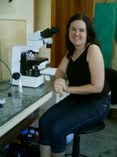Virág Venekey - Professor
Name: Virág Venekey
Study: Master in Nematology, PhD in Oceanography
Graduated in: 2007
Job title: Professor
Company/Institute: Federal University of Pará, Brazil, www.ufpa.br
Sector: Institute of Biological Sciences
1. Current position
My work as a professor includes teaching and doing research.
I teach to graduate and post-graduate students. My graduation classes are for the Biology and Oceanography students and I have been teaching them about General Ecology (with application in aquatic ecosystems), Scientific Methodology and Benthology. As for the post-graduation classes, they are for the Master- and PhD-students of the Post-graduation in Aquatic Ecology and Fisheries Resources and include themes as Scientific Methodology, Marine Ecology and Benthology.
The other part of my job is to carry on research about ecology and taxonomy of meiobenthos with an emphasis on nematodes from different parts of Amazonian estuaries, reefs and sandy beaches.
The best thing about my job is to be part of the formation of new biologists and scientific researchers. Just seeing them achieving their diploma and professional ambitions gives me great satisfaction.
To be a professor, you must be open-minded because we need to teach very different types of students (people). Mostly, there is a thin line between keeping the teaching quality high but also respecting these differences.
My education was a very good basis for this job. I had the opportunity to learn from the best professionals in my area and this helped me to prepare for my responsibilities nowadays.
2. Career
I graduated in Biological Sciences at the Federal University of Pernambuco in 2001, and came to Belgium to study Nematology. I got my Masters in Nematology at Ghent University in 2002, went back to the Federal University of Pernambuco and started a PhD in Biological Oceanography.
My PhD graduation was in 2007 and immediately after, I moved to Northern Brazil and started to work as a Post-doc researcher. In Brazil, there are huge differences between regions and the Northern region is the one with a greater need for new researchers and therefore, with more job opportunities. A few months later, a professor position opened up and I was successful in getting it.
3. Labour market
In Brazil, new universities have been created so new job opportunities are appearing for professors and researchers. However, there are also new post-graduation courses and the number of researchers with a Master and PhD degree is growing. Nevertheless, my perception is that the demand is higher than few years ago, especially in more isolated areas of Brazil (out of the main cities).
In my area it is necessary to be open-minded and to have initiative. Also, one needs to understand that as a researcher and a professo,r you will be studying forever. You need to keep up with new knowledge and try to find a way to teach it to new generations.
4. Choosing Nematology
While I was getting my Biological degree, I developed studies with the meiobenthos community and nematodes are the dominant group in that. For a Master degree, it was natural to continue my studies with a focus on nematodes so I went to Belgium.
I would definitely choose the same program again. I learned from the best nematologists and had wonderful personal experiences as well during my student time in Belgium. For those who want to work with nematodes, the Nematology course of Ghent University is the place to be!
5. Study
I finished my Nematology course more than 10 years ago. But even after all this time, after completing my PhD and after having my professor position, my student period following the Nematology course is still one of most important events of my life. Some of my most important professional connections were made due to my time in Belgium.
All the information and knowledge about nematodes I learned there, is still useful today, especially for my research. If I need to choose one, I would say the topics on nematodes morphology and taxonomy are the most important ones.
The most remarkable moment from my time as a Nematology student was the thesis defence. The opportunity to meet many other students from different countries was also a very special personal experience.
6. Helping future students
If you want to work with nematodes do not hesitate in applying! The University of Ghent is the best place to learn about nematodes!
With regard to job opportunities: Be open-minded and don’t be afraid in trying to work in different places (or even different countries). You can be positively surprised with your choice!

